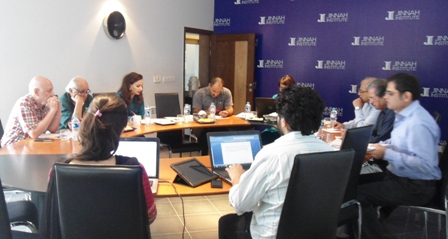Round Table
De-escalation on the LoC is an Urgent Priority
Date: August 16, 2013
Islamabad, 16th August: Short-term thinking and reactive responses from India are endangering the fragile peace process in the region. This was the consensus of a roundtable discussion hosted by the Jinnah Institute in Islamabad on Friday. Senior policy makers, parliamentarians, former military personnel, senior journalists and former state officials attended the event.
A robust discussion between the participants principally focused on identifying the reasons driving the recent escalation at the LOC , as well the actions required to move beyond it. There was also considerable debate on the timing of these episodes, the post-election scenario in Islamabad and the pre-election compulsions in New Delhi. The participants felt that the political situation in Indian administered Kashmir over the last few days was tense and was adversely affecting the current impasse in bilateral relations.
The discussants agreed that Pakistan’s government had issued the right signals in the aftermath of the escalation, and that there was an urgent need for better articulation and policy coherence for peace-building. They also noted that there was an almost absolute consensus amongst Pakistan’s mainstream parliamentarians on normal relations with India.
The discussion was held in the backdrop of the latest escalation of violence between India and Pakistan across the Line of Control (LOC) earlier this month. Tensions had risen across the border after Indian soldiers were ambushed and killed in a remote district in Kashmir. The two armies have since responded with tit-for-tat shelling and violations of the ceasefire.
The roundtable recommended the following steps for de-escalation of the conflict.
1. The group expressed concern that the recent incidents across the LoC had severely impacted the modest progress made in bilateral relations and recommended that credible investigations be urgently initiated to ascertain the facts on the ground to the satisfaction of both parties;
2. That the ceasefire has held since 2003 and existing mechanisms for confidence building on the LoC need to be strengthened forthwith. UNMOGIP is one existing entity that can be productively utilized for this purpose. Furthermore, the DGMO hotlines should be utilized more effectively and in less pro forma manner in order to diffuse tensions;
3. That the bilateral dialogue process should be resumed at all levels. The Prime Ministers should meet on the sidelines of the UNGA to ensure the sustainability of the dialogue process. Back channel efforts, initiated a few weeks earlier, should be brought to bear on the dialogue process;
4. Both the countries should ensure that their soil is not used against the other for acts of terrorism;
5. The unrest in Indian held Jammu and Kashmir is a reminder that both sides need to commit themselves to a renewed effort at resolving this long-standing dispute;
6. The media on both sides should report responsibly and help build a narrative of peace, jointly and nationally, to create normalcy. Journalists should be granted access to the LoC to ascertain facts on the ground.
Participants of the discussion included Amb. Sherry Rehman, MNA Naveed Qamar, MNA Shafqat Mahmood, Amb. Humayun Khan, Amb. Aziz Ahmad Khan, Maj. Gen. Athar Abbas, Nasim Zehra, Zahid Hussain, Wajahat S. Khan, Raza Rumi and Rafiq Dar, JKLF.
Coverage: Express Tribune, Pakistan Observer

